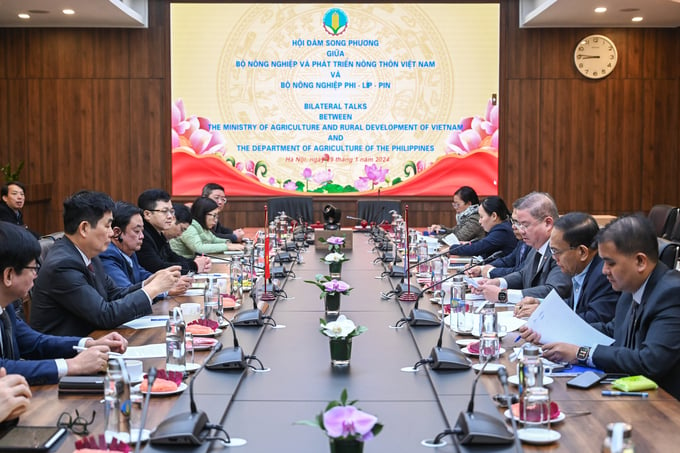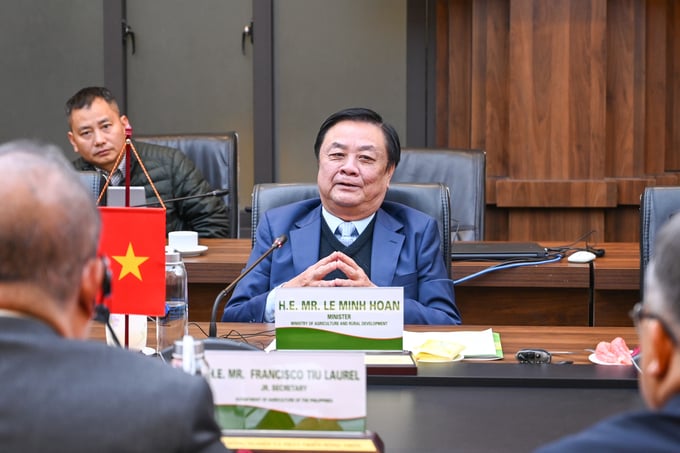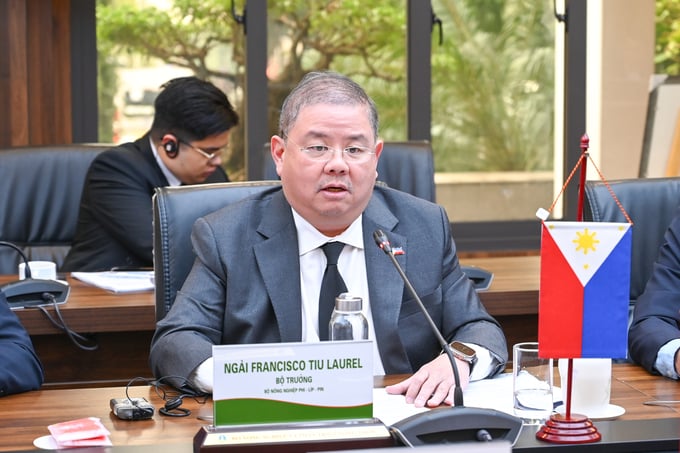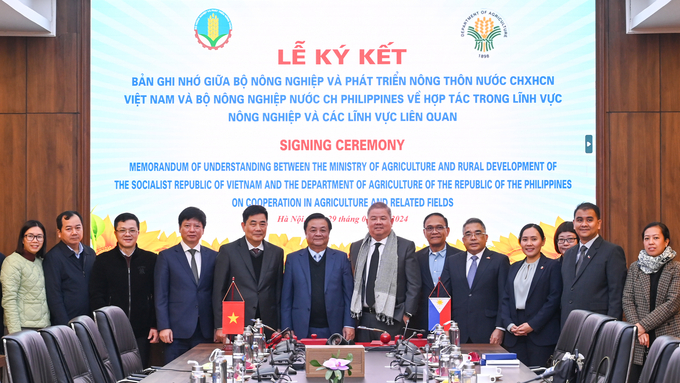June 18, 2025 | 05:14 GMT +7
June 18, 2025 | 05:14 GMT +7
Hotline: 0913.378.918
June 18, 2025 | 05:14 GMT +7
Hotline: 0913.378.918

Bilateral meeting between MARD and the Ministry of Agriculture of the Philippines. Photo: Quynh Chi.
On January 29, at the Ministry of Agriculture and Rural Development, Minister Le Minh Hoan welcomed and held discussions with Mr. Francisco Tiu Laurel, Jr., the Minister of Agriculture of the Philippines, during the high-level visit of the Philippine Presidential Squadron to Vietnam.
During the discussion, Minister Le Minh Hoan expressed gratitude to Minister Francisco Tiu Laurel, Jr. for consistently supporting and enhancing cooperation between the agricultural sectors of both countries. The head of the Ministry of Agriculture and Rural Development hopes to continue receiving support for further collaboration in agriculture, forestry, and fisheries, unlocking the full potential of both nations.
"In the current scenario of continually rising rice prices, Vietnam has managed to maintain rice exports at levels comparable to previous years. The rice output reached 43.5 million tons, marking a 1.9% increase, and the productivity reached 6.1 tons/ha. In 2023, Vietnam exported over 8 million tons of rice valued at 4.8 billion USD. At the close of 2023, Vietnam successfully hosted the International Rice Festival for the first time, fostering connections and opening up numerous opportunities for collaboration in the field of rice," shared Minister Le Minh Hoan with the Philippine delegation.

Minister Le Minh Hoan shares about Vietnam's direction toward green transformation.
Under the new strategy, Vietnam aspires to become a transparent, responsible, and sustainable food supplier. The recent directive from the Prime Minister of Vietnam emphasizes the necessity to increase rice production, ensure national food security, boost high-quality exports, and establish a reputable brand for the national rice industry.
The head of the Philippine Department of Agriculture expressed high appreciation for the efforts of the Ministry of Agriculture and Rural Development in its pivotal role of connecting stakeholders to contribute to global food security. Minister Laurel stated, “The Philippines considers Vietnam a crucial partner in ensuring domestic food security, with up to 80% of our rice imports originating from Vietnam. We eagerly anticipate learning more about how your country develops high-quality rice varieties that can adapt and withstand adverse weather conditions such as drought, saltwater intrusion, floods, and pests."

Minister Francisco Tiu Laurel, Jr. considers Vietnam a crucial partner in ensuring Phillipines' food security.
Vietnam's initiative, "1 million hectares of specialized rice cultivation with high quality and low emissions associated with green growth in the Mekong Delta until 2030," builds upon the success of the rice industry over the years. The government's approval of this project, widely publicized at the recent COP 28 Conference, has affirmed the sustainability of the Vietnamese rice brand, attracting international interest for further exploration.
Among the notable figures, former Minister of Agriculture and Rural Development Cao Duc Phat, who now serves as the Chairman of the Board of Directors of the International Rice Research Institute (IRRI), has made significant contributions to ensuring national food security. During the bilateral talks, Mr. Phat expressed, "Vietnam and the Philippines' agriculture do not compete but complement each other. Therefore, I propose that the two Ministers guide agencies under their respective Ministries to collaborate with the utmost sincerity, openness, and a strict spirit, aiming towards common prosperity."
Furthermore, Minister Le Minh Hoan expressed his hope that the Philippines will closely coordinate with Vietnam to combat illegal, unreported, and unregulated (IUU) seafood exploitation. Building upon the Memorandum of Understanding between the two governments on fisheries cooperation, Mr. Hoan urged the Philippine Ministry of Agriculture to promptly direct specialized agencies to provide feedback on the signing of the Agreement to establish a hotline, thereby strengthening IUU management.
As a nation that successfully removed the IUU "yellow card" within a year, Mr. Laurel expressed his willingness to share his experience with Vietnam. The Philippine minister underscored that the removal of the IUU yellow card is a collective responsibility aimed at building the image of a sustainable ASEAN seafood industry. He emphasized the importance of preventing and addressing issues related to fishing vessels and fishermen violating each other's waters, along with forms of information exchange as specified in the implementation instructions.

The signing ceremony of the Memorandum of Understanding between two Ministries of Agriculture.
To further enhance agricultural, forestry, and fishery cooperation in line with the potential of both countries, the two Ministers formalized their commitment by signing a Memorandum of Understanding between Vietnam and the Philippines. The memorandum underscores the resolve to reinforce scientific and technical cooperation in the field of Agriculture and Rural Development, thereby contributing to the strengthening of bilateral relations.
Accordingly, units under the Ministry of Agriculture of both countries will actively encourage, facilitate, and promote cooperation in various areas, including crop and livestock production (including dairy), valuable aquaculture, high-value post-harvest and food processing facilities, food quality control, farm management and sustainability, animal health and nutrition, geographical indications, as well as the promotion of investment and agricultural trade between trading companies of the two countries.
Translated by Quynh Chi

(VAN) According to the Binh Thuan Department of Industry and Trade, in the first five months of 2025, Binh Thuan's dragon fruit export turnover increased by 20.65% compared to the same period last year.

(VAN) EU countries on Thursday gave final approval to new tariffs on fertilizer imports from Russia, a move aimed at cutting off revenue that could support Moscow’s war in Ukraine, despite concerns from European farmers.

(VAN) The working delegation from the Ministry of Agriculture and Environment conducted an important trip to the Netherlands to strengthen strategic partnerships and sustainable development in the agricultural sector.

(VAN) The letter ‘A Plea from the Ocean’ not only evokes emotion but also awakens the human conscience to the responsibility of protecting life on Earth.

(VAN) The Department of Agriculture in South Africa has announced the country’s first mass vaccination of poultry to prevent local birds from contracting avian influenza.

(VAN) Establishment of the Mekong Delta Regional Agricultural Linkage Center, aiming for a closed value chain, deep processing, trading platforms, and international market connectivity.

(VAN) Gia Lai province has recently recorded 460 rare species of animals and plants, contributing to forest conservation and biodiversity planning in the region.